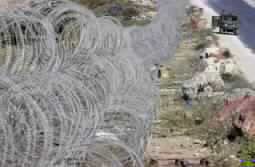Israel Builds Fence Around Jerusalem
29/05/2002| IslamWeb
 HIGHLIGHTS: Some Israelis Complain Fence is Re-dividing City||Fence to Be Completed in Six Months||Fence Leaves Many Settlements on the Other Side of Israel||STORY: A fence going up around Jerusalem is meant to stop Palestinian bombers, an Israeli Cabinet Minister said Tuesday, but some Israelis are complaining it amounts to re-dividing the city. (Read photo caption)
HIGHLIGHTS: Some Israelis Complain Fence is Re-dividing City||Fence to Be Completed in Six Months||Fence Leaves Many Settlements on the Other Side of Israel||STORY: A fence going up around Jerusalem is meant to stop Palestinian bombers, an Israeli Cabinet Minister said Tuesday, but some Israelis are complaining it amounts to re-dividing the city. (Read photo caption)
The decision to build the fence of thick coils of wire around Jerusalem - 9 feet high at points - came after repeated Palestinian bombing attacks in the Jewish section of the city.
Palestinians from the West Bank and Gaza are banned from entering Jerusalem, but Palestinians, most looking for work, take roundabout routes to avoid roadblocks. Bombers and other attackers also find entrance easy.
Public Security Minister Uzi Landau, visiting the fence, defended it against critics.
So far, sections of five miles of the fence have been built, and officials plan to put fencing and other barriers around the 12-mile perimeter of the city. Israel hopes to complete the fence within the next six months, said David Tzur, a police commander overseeing the fence plan.
Palestinians have complained bitterly about the ban on entering Jerusalem, imposed after the current round of Mideast violence erupted in September 2000.
Palestinians who live in nearby villages and neighborhoods are unable to work in the city, and Muslims are often banned from praying at Haram Al-Sharif, Islam's third holiest mosque, in the Old City of Jerusalem. About 200,000 Palestinians live in the city, making up a third of Jerusalem's population.
The issue of the fence is further complicated because Jerusalem's city limits are in dispute.
In the 1967 Mideast war, Israel captured the Arab section of the city and annexed it weeks later, expanding Jerusalem's boundaries to the north and south. Israel claims the whole city as its capital.
Any other country never recognized the annexation, and the Palestinians want to create a state with the Arab section as its capital.
Palestinians charge that building the fence is a way of perpetuating Israel's occupation of the Arab part of the city.
However, some Israelis complain that the fence does not encompass all of the annexed areas, signaling re-division of the city.
Pinhas Wallerstein, a leader of Jewish settlers in the West Bank, said he was concerned about security fences in general, pointing to the government-approved idea of building a fence along the line between the West Bank and Israel, leaving many settlements on the other side.
"The Jerusalem fence will not stop terrorists," Wallerstein told The Associated Press. "Without a political solution, and there is no political solution on the horizon, a fence is like aspirin."
In the south, the barbed wire and other barriers are meant to protect the Har Homa and Gilo neighborhoods, which are situated along the eastern edge of the city facing the outskirts of the West Bank town of Bethlehem, built on land Israel captured in 1967.
The section being constructed in the north, near the Atarot airport, is meant to stop attackers from infiltrating from the Ramallah area.
The border between Israel and the West Bank is largely open to infiltration, and Israel has avoided erecting physical obstacles for fear this might weaken its claim to at least some of the territory before a negotiated settlement. A fence would also leave many Jewish settlers on the other side from Israel.
PHOTO CAPTION
An Israeli Army jeeps patrols along the barbed wire fence that separates the northern outskirts of Jerusalem with the West Bank, near the Kalandia checkpoint Tuesday May 28, 2002. The decision to build the fence around Jerusalem came after repeated Palestinian Resistance bombing attacks in the Jewish section of the city. (AP Photo/Enric Marti)
www.islamweb.net
